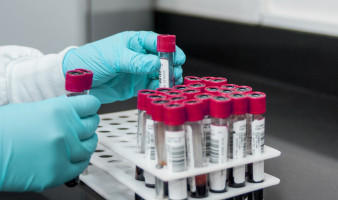
A University of Rochester research team is reporting a new way to detect cancer cells with a “liquid biopsy” that’s designed to be simpler, faster, and more informational than current methods.
What is a liquid biopsy?
It is a non-invasive test that uses blood, urine, and other bodily fluids as a vehicle for finding cancer cells or other molecules released by tumours.
A liquid biopsy can detect or screen for cancer or monitor progression of the disease and how the body responds to cancer treatment.
James McGrath, PhD, the William R.Kenan Jr. Professor of Biomedical Engineering at UR, and a member of the Wilmot Cancer Institute scientific team, led a collaboration to develop a tool that collects cellular material (genes and proteins) called extracellular vesicles (EVs).
Selecting and analysing EVs provides valuable information about diseases in the body.
Despite excitement and longstanding potential in this field, the problem has centred on the best way to analyse the “bioactive cargo” in EVs and develop an accurate biopsy tool.
Researchers describe current methods as costly, complex, and too limited because they don’t allow scientists to analyse multiple biomarkers simultaneously.
The UR imaging-based tool takes a digital approach and has proven in early studies to be more sensitive as it sorts hundreds of thousands of EVs.
Researchers say it can detect cancer at earlier, more curable stages, and unpack the function of EVs, which play a role in the spread of cancer and the way the immune system responds to the disease.
Their work is reported in the journal Small, a nanoscience and nanotechnology publication, with Samuel Walker, a biomedical engineering student, as first author.
In addition, Jonathan Flax, MD, a research assistant professor in Urology, and Scott Gerber, PhD, associate professor of Surgery and cancer investigator at Wilmot, are collaborating to discover EV-based biomarkers to detect whether immunotherapy is working against cancer.
Future plans include using the new tool in clinical research to guide results of treatment-based clinical trials, McGrath said.
The World Cancer Declaration recognises that to make major reductions in premature deaths, innovative education and training opportunities for healthcare workers in all disciplines of cancer control need to improve significantly.
ecancer plays a critical part in improving access to education for medical professionals.
Every day we help doctors, nurses, patients and their advocates to further their knowledge and improve the quality of care. Please make a donation to support our ongoing work.
Thank you for your support.